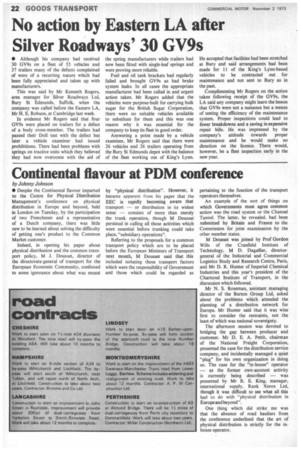Continental flavour at PDM conference
Page 24

If you've noticed an error in this article please click here to report it so we can fix it.
by Johnny Johnson
• Despite the Continental flavour imparted to the Centre for Physical Distribution Management's conference on physical distribution in Europe and beyond, held in London on Tuesday, by the participation of two Frenchmen and a representative of a Dutch company, there was little new to be learned about solving the difficulty of getting one's product to the Common Market customer.
Indeed, in opening his paper about physical distribution and the common transport policy, M J. Dousset, director of the directorate-general of transport for the European Economic Community, confessed to some ignorance about what was meant
by "physical distribution". However, it became apparent from his paper that the EEC is rapidly becoming aware that transport — or distribution in its widest sense — consists of more than merely the trunk operation, though M Dousset persisted in calling all those activities which were essential before trunking could take place, "subsidiary operations".
Referring to the proposals for a common transport policy which are to be placed before the European Ministers of Transport next month, M Dousset said that this included isolating those transport factors which were the responsibility of Government and those which could be regarded as pertaining to the function of the transport operators themselves.
An example of the sort of things on which Governments must agree common action was the road system or the Channel Tunnel. The latter, he revealed, had been submitted by Britain and France to the Commission for joint examination by the other member states.
M Dousset was joined by Prof Gordon Wills of the Cranfield Institute of Technology, M D. Dagallier, directorgeneral of the Industrial and Commercial Logistics Study and Research Centre, Paris, and Mr D. R. Hunter of Imperial Chemical Industries and this year's president of the Chartered Institute of Transport, in the discussion which followed.
Mr N. S. Roseman, assistant managing director of the Burton Group Ltd, asked about the problems which attended the planning of a distribution network for Europe. Mr Hunter said that it was wise first to consider the restraints, not the least of which was national sovereignty.
The afternoon session was devoted to bridging the gap between producer and customer. Mr D. E. A. Pettit, chairman of the National Freight Corporation, presented the case for the distribution service company, and incidentally managed a quiet "plug" for his own organization in doing so. The case for the "in-house" operator — as the former own-account activity is currently being described — was presented by Mr R. E. King, manager, international supply, Rank Xerox Ltd, though it was difficult to see what all this had to do with "physical distribution in Europe and beyond".
One thing which did strike me was that the absence of road hauliers from the conference underlined that the art of physical distribution is strictly for the inhouse operator.
























































































































